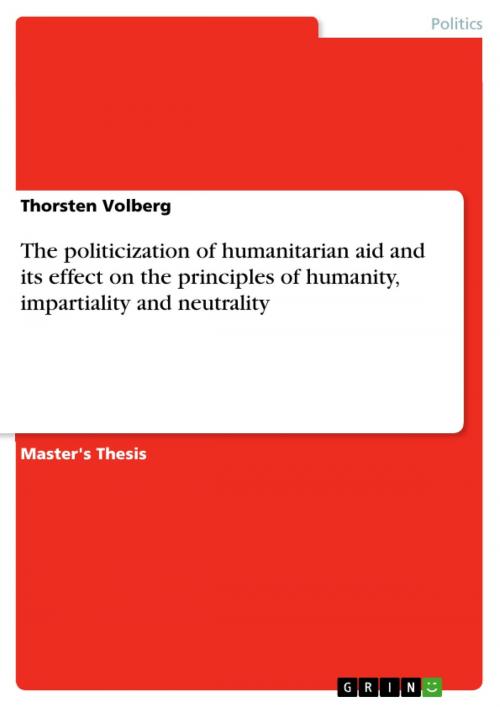The politicization of humanitarian aid and its effect on the principles of humanity, impartiality and neutrality
Nonfiction, Social & Cultural Studies, Social Science| Author: | Thorsten Volberg | ISBN: | 9783638039338 |
| Publisher: | GRIN Publishing | Publication: | February 2, 2007 |
| Imprint: | GRIN Publishing | Language: | English |
| Author: | Thorsten Volberg |
| ISBN: | 9783638039338 |
| Publisher: | GRIN Publishing |
| Publication: | February 2, 2007 |
| Imprint: | GRIN Publishing |
| Language: | English |
Master's Thesis from the year 2006 in the subject Politics - International Politics - Topic: Development Politics, grade: 1,7, Ruhr-University of Bochum (Institute for International Law of Peace and Armed Conflict), course: European Masterprogram on Humanitarian Action (NOHA), 107 entries in the bibliography, language: English, abstract: The humanitarian principles of humanity, neutrality and impartiality provide an ethical framework that defines and delineates the humanitarian space within which relief agencies are supposed to operate. Current experiences, however, show that these traditional principles were not designed to cope with the development underlying the increasing merging of humanitarian aid and politics. To avoid political manipulation, relief organizations must rethink these traditional principles and face the responsibility of getting more involved in the broader political arena to be able to take appropriate action, and to avoid longterm damages on a society. The 'Sphere' project, which was launched to improve the quality of humanitarian action and to put relief aid on a legal basis as set forth by international law, acknowledges the dependence of humanitarian aid on external political decisions. Still, it emphasizes traditional principles and expresses agencies' commitment to act in accordance with them. 'Sphere's actual value must therefore be seen in defining a common basis around which agencies, donors and governing authorities can potentially agree on. It provides a basis for defining core humanitarian responsibilities that recognizes the limits of humanitarian action, while setting an agenda for individual and collective action. Even though the attempt to define humanitarian principles that serve as blueprints in every global emergency for all humanitarian organizations does not seem to be achievable, the importance of ethical guidelines and benchmarks still exists. The heterogeneity of relief work is just a phenomenon, which is based in the nature of humanitarianism and this will always put a stamp on attempts to find common standards, principles and codes.
Master's Thesis from the year 2006 in the subject Politics - International Politics - Topic: Development Politics, grade: 1,7, Ruhr-University of Bochum (Institute for International Law of Peace and Armed Conflict), course: European Masterprogram on Humanitarian Action (NOHA), 107 entries in the bibliography, language: English, abstract: The humanitarian principles of humanity, neutrality and impartiality provide an ethical framework that defines and delineates the humanitarian space within which relief agencies are supposed to operate. Current experiences, however, show that these traditional principles were not designed to cope with the development underlying the increasing merging of humanitarian aid and politics. To avoid political manipulation, relief organizations must rethink these traditional principles and face the responsibility of getting more involved in the broader political arena to be able to take appropriate action, and to avoid longterm damages on a society. The 'Sphere' project, which was launched to improve the quality of humanitarian action and to put relief aid on a legal basis as set forth by international law, acknowledges the dependence of humanitarian aid on external political decisions. Still, it emphasizes traditional principles and expresses agencies' commitment to act in accordance with them. 'Sphere's actual value must therefore be seen in defining a common basis around which agencies, donors and governing authorities can potentially agree on. It provides a basis for defining core humanitarian responsibilities that recognizes the limits of humanitarian action, while setting an agenda for individual and collective action. Even though the attempt to define humanitarian principles that serve as blueprints in every global emergency for all humanitarian organizations does not seem to be achievable, the importance of ethical guidelines and benchmarks still exists. The heterogeneity of relief work is just a phenomenon, which is based in the nature of humanitarianism and this will always put a stamp on attempts to find common standards, principles and codes.















